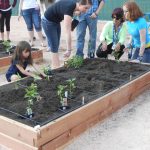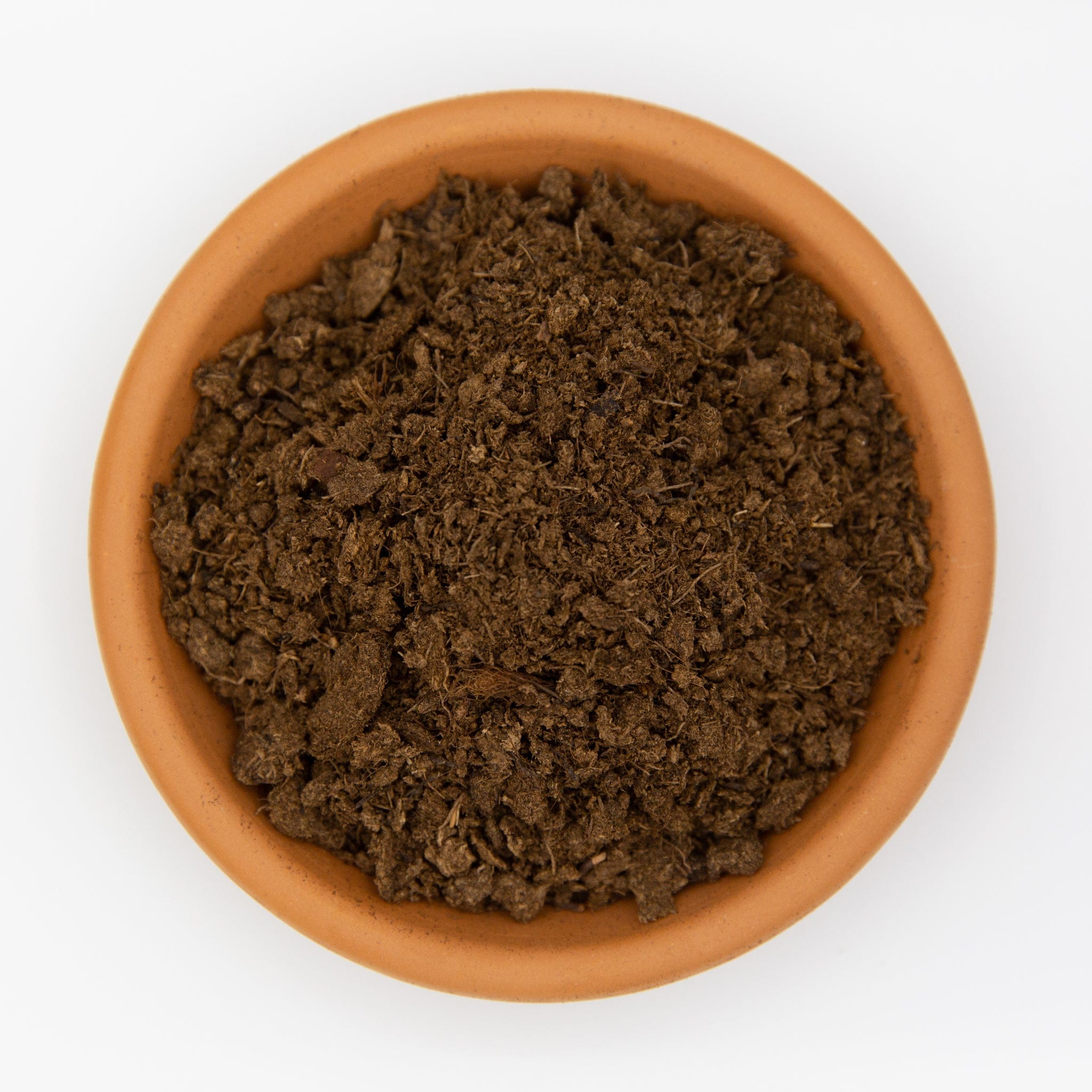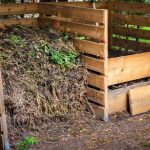In gardening, compost, and garden soil are two types of organic matter used to improve the quality of the soil. Garden soil is the natural soil found in gardens, while compost is decayed organic matter that you can add to your garden soil to improve its fertility and structure.
Mulch, on the other hand, is any material used to cover the surface of the soil, which can have a variety of benefits. This includes conserving moisture in the soil, suppressing weed growth, and regulating soil temperature.
What Is The Composition And Nutrient Content Of Compost?
The composition of compost varies depending on the materials used in the composting process. It typically consists of a combination of organic matter such as food waste, leaves, grass clippings, and wood chips.
Additionally, compost may contain a small percentage of inorganic matter, such as minerals and trace elements. Compost is rich in essential nutrients that plants require for healthy growth. It contains significant levels of nitrogen, phosphorus, and potassium, commonly referred to as NPK.
These macronutrients are crucial for promoting leafy growth, strong root development, and overall plant vigor.

How You Can Define Garden Soil?
Garden soil refers to the natural soil present in your garden or the soil you purchase for use in containers or raised beds. It is a blend of minerals, organic matter, air, and water. Garden soil can vary in texture, ranging from sandy to clayey, and its composition plays a vital role in determining the plant’s health and growth.
Composition And Nutrient Content Of Garden Soil
The composition of garden soil includes a mix of inorganic matter, organic matter, air, and water. The inorganic matter consists of different-sized mineral particles, such as sand, silt, and clay, which determine the soil’s texture.
The organic matter in garden soil provides nutrients, improves moisture retention, and enhances the soil’s structure.
Garden soil contains varying levels of nutrients, depending on its composition and location. It typically contains essential macronutrients like nitrogen, phosphorus, and potassium, as well as micronutrients such as iron, zinc, and manganese.
The availability of these nutrients can be influenced by factors such as pH, organic matter content, and soil organisms.

Compost Vs Garden Soil: Which One Is Right For Your Plants?
Choosing the right type of soil for your plants is crucial for their overall health and productivity. When it comes to compost and garden soil, both have their own set of benefits and properties that can support plant growth. However, understanding the factors to consider when making a choice between compost and garden soil is essential to ensure the best results for your garden.
Factors To Consider When Choosing Between Compost And Garden Soil
Before making a decision, it is important to evaluate the factors that can influence the effectiveness of compost and garden soil for your plants. These factors can vary depending on the type of plants you are growing, the quality of your existing soil, and your overall gardening goals and objectives.
- Nutrient content: Compost is rich in organic matter and nutrients, making it an excellent choice for plants that require a boost in nutrients. On the other hand, garden soil may have varying nutrient levels depending on its composition and origin.
- Soil structure: Compost is well-suited for improving soil structure, especially in clay or compacted soils. Its ability to retain moisture and improve drainage can create a favorable environment for plant roots. However, if your garden soil already has good structure, adding compost may not be necessary.
- pH levels: Different plants thrive in different soil pH levels. Compost tends to have a near-neutral pH, which is suitable for a wide range of plants. Garden soil, on the other hand, may need amendments to adjust its pH to meet specific plant requirements.
Matching The Nutrient Needs Of Plants With The Properties Of Compost And Garden Soil
Before deciding on compost or garden soil, it’s important to assess the nutrient requirements of your plants. Some plants require high levels of specific nutrients, while others may have more generalized needs. By understanding these requirements, you can determine whether compost or garden soil is better suited for your plants.
| Plants with specific nutrient needs | Compost | Garden Soil |
|---|---|---|
| Heavy feeders (e.g., tomatoes, roses) | Compost provides a rich supply of nutrients, promoting vigorous growth and abundant blooms. | Garden soil may require additional amendments to meet the nutrient demands of these plants. |
| Low nutrient demand (e.g., native plants, succulents) | Compost may provide an excessive nutrient load, potentially leading to over-fertilization and negative effects. | Garden soil with a balanced nutrient composition is usually sufficient. |
The Specific Requirements Of Different Plant Types
Each plant has unique requirements, and understanding these specific needs is crucial in choosing the right soil. For example, some plants prefer well-draining soil, while others thrive in moisture-retentive soil. Some plants are also sensitive to pH variations, requiring soil amendments to create an optimal growing environment.
- Succulents and cacti: These plants prefer well-draining soil that replicates their native environment. Adding compost to your garden soil can improve its drainage and increase water retention capacity.
- Acid-loving plants: Plants such as blueberries and azaleas thrive in acidic soil. Compost with added organic matter can help lower the pH of garden soil to accommodate these plants.
- Herbs and vegetables: Many herbs and vegetables prefer soil with a balanced nutrient composition. Mixing compost with garden soil can provide the necessary nutrition for these plants.

Making The Right Choice Based On Your Gardening Goals And Objectives
Your gardening goals and objectives play a vital role in determining whether compost or garden soil is the right choice for your plants. If you are aiming to improve the overall quality of your soil, increase fertility, or promote long-term soil health, incorporating compost into your garden soil may be ideal.
On the other hand, if your existing garden soil is already of good quality and meets your plant’s nutrient requirements, simply adding a layer of compost as a top dressing may be sufficient.
Ultimately, the choice between compost and garden soil should be based on a thorough evaluation of your specific plant needs, the current condition of your soil, and your overall gardening goals.
By considering these factors and understanding the properties of compost and garden soil, you can make an informed choice that will lead to healthier, more productive plants in your garden.
Using Compost And Garden Soil Together For Maximum Plant Growth
Do you want to take your gardening game to the next level? Look no further than the dynamic duo of compost and garden soil. These two powerhouses, when combined in the right way, can create the perfect environment for your plants to thrive. In this article, we will explore the best practices for using compost and garden soil together, so you can give your plants the optimal conditions they need for maximum growth.
Blending Compost And Garden Soil For Optimal Results
When it comes to using compost and garden soil together, the key is to find the right balance. Blending these two components will provide the perfect combination of nutrients, organic matter, and texture that your plants crave.
Start by assessing the quality of your garden soil and determining its deficiencies. Is it lacking in organic matter or nutrients? Does it drain well or hold too much moisture? Understanding the composition of your soil will help you determine the ratio of compost to garden soil that you should aim for.
Once you have assessed your soil, it’s time to start blending. Mix the compost and garden soil thoroughly, ensuring an even distribution of both components. This will help create a well-balanced growing medium that retains moisture while allowing for proper drainage. Remember, it’s all about finding that sweet spot where your plants can get the best of both worlds.
The Importance Of Maintaining A Balanced Soil Ecosystem
Creating a balanced soil ecosystem is crucial for the long-term health and vitality of your plants. This means not only providing them with essential nutrients but also fostering a thriving community of beneficial microorganisms.
Compost is a rich source of beneficial bacteria, fungi, and other organisms that contribute to the overall health of your soil. When combined with garden soil, compost enriches the ecosystem, improving soil structure and promoting healthy root development.
| Benefits of using compost and garden soil together |
|---|
| Enhances nutrient availability |
| Improves soil structure and drainage |
| Boosts water and nutrient retention |
| Promotes beneficial microorganism activity |
Best Practices For Incorporating Compost And Garden Soil In Gardens And Containers
Whether you have a sprawling garden or a few containers, incorporating compost and garden soil efficiently is key to success. Here are some best practices to keep in mind:
- Start with a layer of compost at the bottom of your garden bed or container. This will ensure that the roots have immediate access to the nutrients.
- Add a layer of garden soil on top of the compost. This will help create a stable root environment and provide additional structure to the growing medium.
- Continue to alternate layers of compost and garden soil until you reach the desired depth.
- For containers, make sure to include drainage holes at the bottom to prevent waterlogging.
- When planting, mix some compost with the garden soil to provide an extra nutrient boost around the roots.

How To Monitor And Adjust The Use Of Compost And Garden Soil?
As with any gardening practice, it is essential to monitor and adjust the use of compost and garden soil over time. Pay attention to the performance of your plants and look out for any signs of nutrient deficiencies or imbalances.
If your plants are exhibiting stunted growth or yellowing leaves, it may be a sign that the compost-to-soil ratio needs adjustment. Regularly test the pH levels and nutrient content of your soil to ensure that it remains in the optimal range for your plants.
By continuously monitoring and fine-tuning the use of compost and garden soil, you can provide your plants with the ideal conditions for maximum growth and yield.

Credit: www.drgreenthumbs.com.au
Frequently Asked Questions Of Compost Vs Garden Soil
What Is The Difference Between Compost And Garden Soil?
Compost is organic matter that has broken down into a nutrient-rich soil amendment, while garden soil is a mineral-based material used to support plant growth. Compost improves soil structure and provides nutrients, while garden soil is used as a base for plants to anchor their roots.
How Is Compost Made?
Compost is made by collecting and decomposing organic materials such as kitchen scraps, leaves, and yard waste. These materials are mixed and allowed to break down over time, with the help of microorganisms. Regular turning and moisture management are important for successful composting.
Can I Use Compost Instead Of Garden Soil?
Compost can be used as a soil amendment to improve the quality of garden soil. However, it is not a complete replacement for garden soil. Compost adds nutrients and organic matter to existing soil, enhancing its fertility and moisture-holding capacity.
What Are The Benefits Of Using Garden Soil?
Garden soil provides a stable base for plant roots to grow and absorb water and nutrients. It also allows proper drainage and aeration, preventing root rot. Garden soil often contains added nutrients and minerals, ensuring optimal plant growth and health.
Conclusion
While both compost and garden soil have their benefits, they differ in their composition and purpose. Compost is rich in organic matter and nutrients, making it ideal for improving soil health and providing plants with essential nutrients. On the other hand, garden soil is a combination of various materials that facilitate proper drainage and support root development.

I am a graduate of Bangladesh Agricultural University, where I delved into various agricultural disciplines, equipping me with a profound understanding of agriculture. Beyond academics, I have hands-on experience in gardening and crop cultivation. My passion is to embrace sustainable farming and horticulture. With a BSc in Agriculture, I am dedicated to promoting environmentally conscious and efficient agrarian practices.
Bachelor of Science (BSc) in Agriculture (Hons.)
Master of Science. (Sustainable Agriculture & Food Security ) (MS)
Bangladesh Agricultural University



